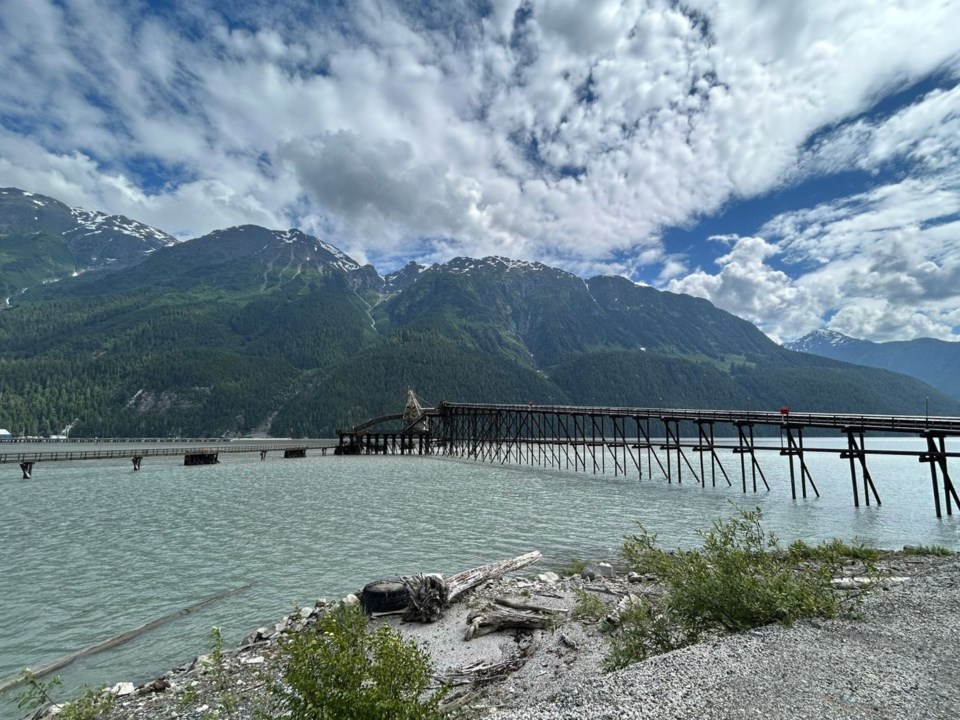Two First Nations have formed a joint partnership with a transport company to purchase the Port of Stewart bulk terminal on the Portland Canal that separates British Columbia and Alaska.
The Nisga'a and Tahltan nations and Arrow Transportation Systems said Monday in a joint statement that the deal to buy Stewart Bulk Terminals Ltd., which owns and operates the facility in Stewart, B.C., is expected to close in the coming months.
The three equal partners said the deepsea terminal's primary purpose is transporting critical minerals such as copper concentrate to market from sources including Newmont's Brucejack and Red Chris mines in Nisga’a and Tahltan territories.
Andrew Robinson, chief executive officer of the Nisga'a Lisims Government, said in an interview that the terminal was in an "excellent position" to support Canada's critical minerals industry.
"This isn't just about us purchasing the first Indigenous majority-owned port in British Columbia's history," said Robinson, "It's about economic sovereignty, reconciliation, and ensuring that wealth generated from our lands directly benefits our people and generations to come."
He said the partnership would seek not just to expand the facility but also create more opportunities for Indigenous communities and residents in the northwest of B.C.
Kerry Carlick, president of the Tahltan government, said in a statement the deal is "making history" and will drive economic growth and self-determination, while Eva Clayton, president of the Nisga'a Lisims government, said it was a chance for "economic reconciliation."
The price of the terminal wasn't included in the statement, but it said the province provided a $5-million grant to the Tahltan and Nisga’a nations to support the purchase.
Robinson said the costs were "best left with the financiers," but the partners were grateful for the support of the B.C. government.
Jagrup Brar, B.C.'s minister for mining and critical minerals, also declined to say how much the terminal cost.
He called the terminal a "very important piece" of infrastructure to ship critical minerals to Asia, with "huge trade" going on with countries like Japan, Korea, China, and India.
"With this particular port, we can grow that potential because this is the closest port to Asia, which means that they can ship the critical minerals and they can reach there sooner," said Brar. "So, it's time saving for the companies, and so it will be quicker, it will be cheaper to reach Asia."
Brar said he visited the port about a month ago and he met the owners, the Soucie family, who he said had owned it for decades.
The partnership's statement quotes B.C. Premier David Eby saying the joint venture furthers reconciliation while creating jobs and "demonstrating how British Columbia will become Canada’s new economic engine.”
Carlick said in an interview that the deal sets a precedent for other Indigenous and economic partnerships across the country.
"It just kind of shows what can be achieved when you work with the Indigenous organizations, and when you work with neighboring nations, like Nisga'a and Tahltan are doing, you can make history," said Carlick.
Carlick said Canada was going through "uncertain" economic times, particularly due to the U.S.-Canada trade conflict.
"And our region specifically has been identified as an area where there's lots of potential, like the economic arm or engine, so to speak, for the whole country," said Carlick.
The partnership between the Nisga’a Nation, Tahltan Nation Development Limited Partnership, and Arrow Transportation creates a new entity called the Portland Canal Holdings Limited Partnership that is also launching a new transportation business by consolidating two regional trucking operations.
The joint statement said northwest B.C. is home to more than half of the province's exploration and mining sector.
"By strategically supporting the flow of critical minerals, the Nisga’a and Tahltan Nations are now positioned to optimize revenue generation, create new business opportunities, and further stimulate economic growth within their respective economies and the wider economies of B.C., Canada, and beyond," it said.
Arrow's executive vice-president, Tim Bell, said consolidating the terminal and its trucking operations creates an integrated supply chain, and the project reflects a commitment "to working with Indigenous communities as equal stakeholders."
The statement said the terminal has six full-time employees and handles about 260,000 tonnes of copper and gold concentrate annually, operating at 50 per cent of rated capacity.
This report by The Canadian Press was first published Aug. 25, 2025.
Nono Shen, The Canadian Press




